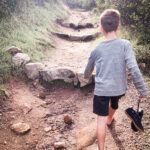Where Adventure Meets Education
What if I told you that there is freedom in homeschool when you drop all the expectations of society. That you can leave the walls of home in search of adventure, and that you don’t need a curriculum.
Could you imagine an education where text books aren’t used, tests aren’t given, and grades don’t exist? Where worksheets aren’t required and subjects aren’t formally studied? Can you imagine an education so far from what the “experts” have said it should be, and that instead places family, experiences, and imagination at its center? Can you completely let go of what we’ve been shown is normal and reimagine education steeped in the light of truth, beauty, and goodness?

This is the blessing of a home education built on adventure. It is a life of seeing new places; familiar places; observation and pondering; noticing and questioning; and learning through experience. It is an education that is built upon caring.
One of my favourite Charlotte Mason quotes is this:
“The question is not, — how much does the youth know? when he has finished his education — but how much does he care? And about how many orders of things does he care? In fact, how large is the room in which he finds his feet set? and, therefore, how full is the life he has before him?”
-Charlotte Mason
If you are only ever placed in a tiny room, how much potential do you have for doing and learning great things? But if you are given the whole world… imagine how much you might find and soak in and love. And this is why we adventure. So not just our children, but even us adults, can take in more of the world and its treasures, and therefore find that which we care about.
Adventure Schooling
Adventure-schooling will not look like a traditional education, or even a typical home education. To fully embrace it, you have to be willing to let go. Willing to allow the ride to be the lesson. Willing to see the value in this way of learning. Because yes, your children are really learning.
Now to be clear, I am not suggesting that you drop every other aspect of your home education and rely solely on adventuring. The beauty of a home education is that there are many wonderful ways to learn all the things you wish for your children to know, and that they themselves wish to know. You do not have to be hiking and traveling daily (but you can if you want to!). But incorporating weekly adventures, if you are able, is a beautiful way to deeply enrich your homeschool. Then you can still spend some time covering the other subjects you feel compelled to stick to.
How does adventuring become the lesson?
Well, consider all that your children take in. If your adventures are local hikes, your children are becoming familiar with local landscapes, plants and animals. Depending on your findings, you may also be learning some history (for example, here in San Diego there is TONS of evidence of the Kumeyaay tribe that lived here). If you are traveling to state or national parks, you are observing changes in geography and topography. And ranger stations and Junior Ranger programs offer tons of historical and local information. If you are taking “field trips” to historical sites, the learning there is pretty obvious.
Learning Alongside the Adventure
Now here’s the gold… whether you prepare in advance, or play catch up based on what you found, the learning from the adventure doesn’t have to stop with the adventure. You can keep it going through further study!
For example: we once were hiking through the local mountains when we happened upon a colony of lady bugs. There were thousands! We had never seen anything like it before, and were naturally curious about why so many were in one place and how that even happened. Our next “school” day, we spent part of our morning time researching lady bugs. We used sources like our Handbook of Nature Study, YouTube, and National Geographic Kids to learn more about these bugs and how this phenomenon came about.
Another time we visited the Barona Cultural Center to learn about the Kumeyaay Indians and their culture. This was such an informative experience, and we were grateful to be able to follow it up with hikes to see the morteros (grinding holes) where shawii was made. We also spent time reading books to help enhance our understanding of early Native Americans, like My Side of the Mountain, Children of the Longhouse, Adopted by Indians, and many more.



Let the Adventure (Education) Begin
And so let the adventure not just be the education, but lead to further education. When children are exposed to more of the world, they have so much more ability to find their passions and truly care. This is where a full life comes from; where adventure becomes and fuels the education. And let me tell you, it truly is a rich way to live and learn.
Not sure how to make time for adventure? You can find information and inspiration to help you create a “home” education you’ll love here.
What do you think? Can the adventure become the education?


